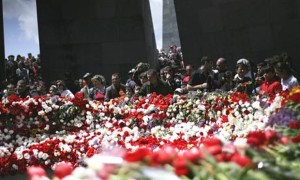
Credit: Funeralflowers.com
In Dostoyevsky’s Crime and Punishment, an impoverished widow spends her last rubles on her husband’s funeral and ends up destitute with her three children. The bitter satire of that chapter can still ring as true today as it did in 1866. Some families will risk their livelihood to “properly” honor their dead loved ones. Whether a religious follower or an atheist, many agree that the physical body holds no significance after death. Why then are so many willing to venerate the dead at a cost to the living?

Armenian Funeral
(Credit: theguardian.com)
Jack Aslanian details his experience in Armenia in The Guardian, pointing out the extravagant fashion and the expensive funerals he encountered in Yerevan. These funerals are a huge financial burden for the bereaved, lasting three days that include three memorial meals, vigils and expensive wreaths that flank the home of the departed.
“An average funeral wreath can set back a sympathiser around $100 – the monthly income of a teacher, ” Aslanian points out. Why such extravagant spending on funerals? Aslanian believes it’s a matter of “personal dignity.”
“An average funeral wreath can set back a sympathiser around $100 – the monthly income of a teacher” –Jack Aslanian

A Custom Coffin
(Credit: thisisafrica.me)
In South Africa, memorial services come at an even greater cost. Often, 40 percent of household annual income is spent on expensive caskets, newly tailored clothes and colossal feasts. Since the bereaved family is also expected to house and feed relatives from all over the country, they are often forced to take out high-interest loans. According to a 2004 study, funeral costs were the reason behind more than half of impoverished households in rural Kenya. In Cameroon, families often choose to save for funerals and skip on necessary medical costs. Massive, costly funerals are expected, and serve as the center of social and familial relationships. Professor Michael Jindra, the co-editor of Funerals in Africa: Explorations of a Social Phenomenon, explains the paradox: “In the west, marriages are often the biggest life-cycle events. In Africa, it’s funerals by far.”
In the United States, the average cost of a funeral is $7,000, not including other possible expenses such as a gravesite, vault, opening and closing of the grave, or the grave marker. Considering that the American household income averages at about $24,000 per year, the funeral expenses can easily consume about a third of that annual income. The aim of these expenditures is to create a unique and personalized service that will help honor dead loved ones and keep their memories alive.
“In the west, marriages are often the biggest life-cycle events. In Africa, it’s funerals by far.” — Michael Jindra
A bereaved family may want to continue giving to their loved ones even after they are no longer alive; a sumptuous funeral service may be one way to show their love. Whether a funeral, a memorial service or a wake, honoring one’s life and heritage is an important part of grieving, healing and gaining a sense of support and kinship.
Sometimes, however, grief may overtake reason. Cincinnati Funeral Consumer cites several reasons why Americans may spend more than they can afford on funerals. Among them are guilt, misinformation and a lack of proper planning. There is another common thread that runs through different cultures. It is a notion that a family will somehow be judged for choosing less costly options, and their decision to not “keep up with the Joneses,” even in funeral matters, will make them appear socially or economically inferior and possibly even disrespectful to the dead.
“It’s never easy bringing up the subject of funeral planning but pre-arranging a funeral with the help of family can avoid unnecessary financial burdens to those left behind.” — Hilary Fisher
A question remains: what would loved ones want after their deaths? Would they expect their family to risk their economic well being by spending their savings on them after death? Would they want their family to spend more on the dead than they do on the living? Perhaps in some cultures, it’s expected, but even then, what if a step is taken outside of what’s customary and funeral plans are discussed ahead of time, while everyone is able and alive? Perhaps the option that a loved one may choose will not simply be more affordable, but also more meaningful and beneficial for everyone involved.
Hilary Fisher, director of Dying Matters, a national coalition raising awareness on death, dying and bereavement, stresses the importance of planning and preparation. “It’s never easy bringing up the subject of funeral planning but pre-arranging a funeral with the help of family can avoid unnecessary financial burdens to those left behind,” she says.

 Who is Left to Pay?
Who is Left to Pay?



 Composting Bodies Is Now Legal in a Dozen States
Composting Bodies Is Now Legal in a Dozen States
 “Hand to Earth” by Andy Goldsworthy
“Hand to Earth” by Andy Goldsworthy














